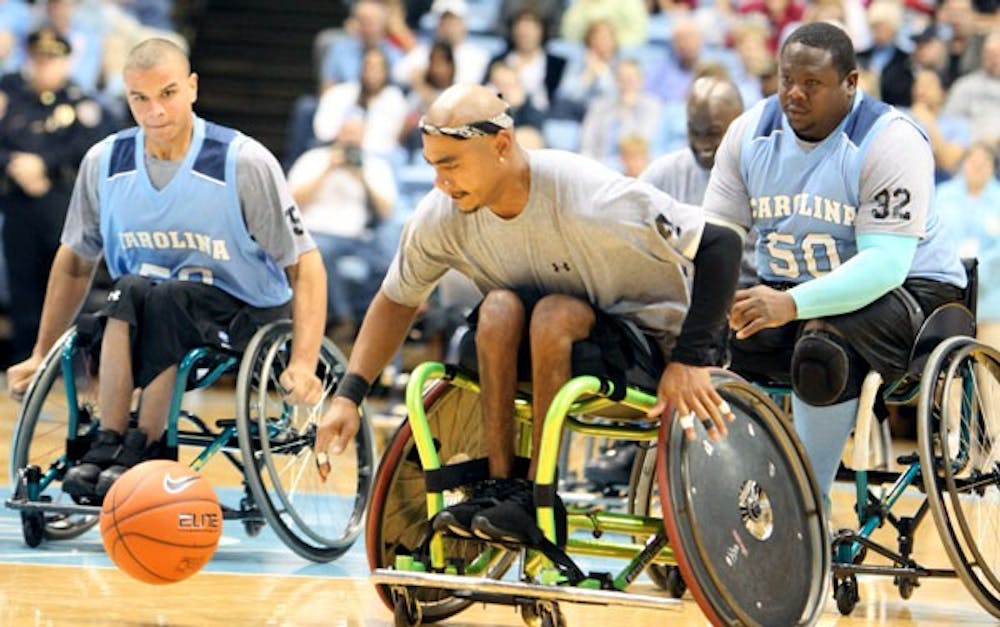For Kevin Bailey, Friday night’s wheelchair basketball game at the Smith Center was more than a 10-minute scrimmage.
Bailey fell off a roof in 1996 — the year after he graduated from UNC — and was paralyzed below the chest.
Friday, he was back at his alma mater, playing at halftime of the UNC-Belmont Abbey exhibition game. The last time he was on the court was as a student fan celebrating a win, he said.
“This was definitely not just another event,” he said. “To actually be on the court instead of watching from the stands was incredible. There’s just no other way to describe it.”
During the game, the players did the same things as able-bodied athletes: made layups, launched shots from outside, jostled for position in the lane.
The crowd reacted to every made basket, every in-and-out and every fast break, just as it did for UNC.
“It was the fulfillment of a dream to be on the floor playing,” said Ashley Thomas, executive director of Bridge II Sports, which organized the event. “We were so thrilled to be able to do this.”
Eleven wheelchair basketball players from the Carolina Wheelchair Basketball Conference were picked to participate by Bridge II Sports, which links people in wheelchairs with athletic opportunities.
The scrimmage was coached by Justin Kiley, whose father, Dave, earned nine Paralympic gold medals in basketball, skiing and racing.
The players represented all levels of experience. Mike Atkins, who co-founded the team he plays for in 1992, and Timothy Corbett, now the commissioner of the Carolina Conference, are 17-year wheelchair basketball veterans. Sean Burns and Akeem Hassell are high-schoolers playing up.
“Just to see all the blue, the fans so into it, was a special experience,” Corbett said. “It was an honor to play on the court where Jordan played, where ’Sheed played, where my heroes played.”
Fellow player Daniel Moody was equally impressed.
“It was like playing in the Holy Land,” he said.
The scrimmage was refereed by Raymond Miller, who has officiated wheelchair basketball for more than 12 years, including two National Wheelchair Basketball Association championships and the 1996 Paralympic Games.
“These are some phenomenal athletes,” Miller said. “They’ve beaten a lot of pros in these chairs. It’s always a pleasure to be in their company.”
Bailey was still in the hospital when a therapist asked him about playing wheelchair basketball.
“I grew up playing basketball,” he said. “It made sense to keep going, even in a chair.”
He said the chair skills were hard to learn at first and took some time to develop.
Dribbling, for example, requires quickly alternating between bouncing the ball and pushing the wheelchair. Going three pushes without dribbling is a traveling violation.
“People think they can’t do the same things, but it’s the same rules, the same game, just in a chair,” Kiley said.
“But you could see how many people were out there cheering. We were showing them we can do whatever they can do.”
Contact the City Editor at citydesk@unc.edu.
Wheelchair basketball game gives inspiration

Participants of Bridge II Sports, a program for disabled athletes, play at halftime during UNC’s exhibition game. DTH/Phong Dinh

